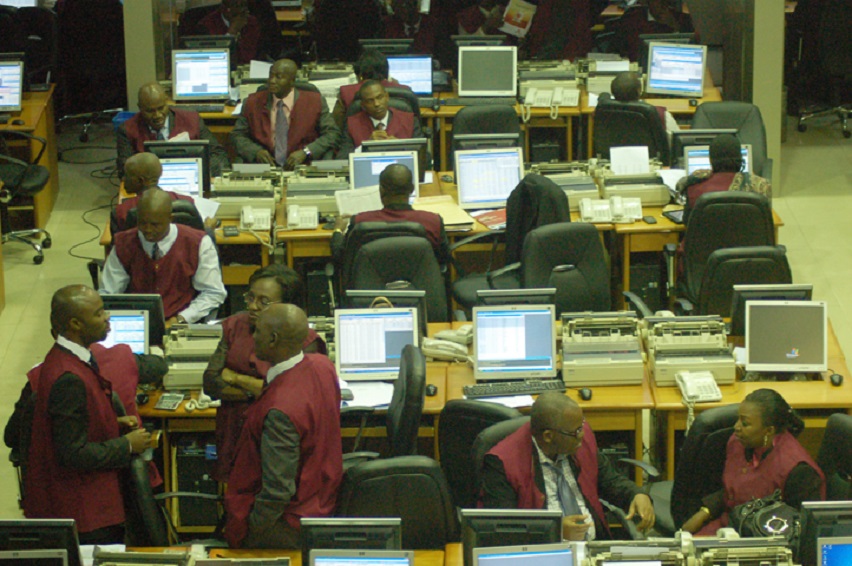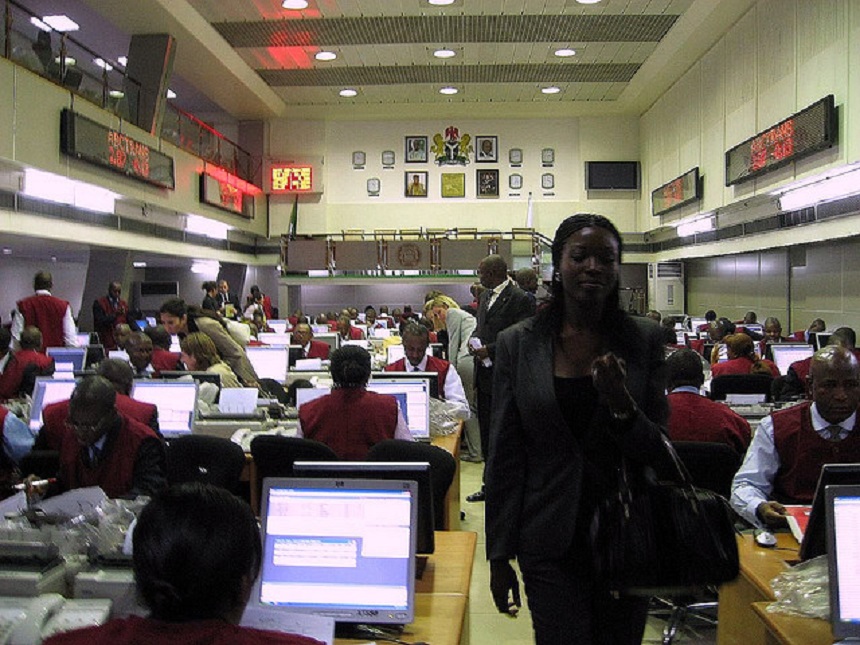Economy
Nigerian Stocks Down by 0.15% as Market Remains Volatile

By Dipo Olowookere
Transactions on the trading floor of the Nigerian Stock Exchange (NSE) remained weak today as profit-taking activities persist, extending to the second trading session of this week.
Business Post reports that the market remained volatile on Tuesday as investors continue to react to the poor 2017 earnings released by Diamond Bank Plc last week in the absence of any positive news to positively change the mood and override the shocker.
Even news of the possible passage of the 2018 budget this week by the Senate was not enough to cheer investors.
The budget report was finally laid before both the Senate and the House of Representatives today with the estimates increased to N9.12 trillion from N8.61 trillion by the lawmakers.
At the close business on Tuesday, the local went down further by 0.15 percent, reducing the Year-to-Date (YtD) returns to 6.20 percent.
The All-Share Index (ASI) depreciated by 62.19 points to settle at 40,615.42 points, while the equity capitalisation reduced by N22.5 billion to finish at N14.712 trillion.
A look at the sector performance showed that the NSE Banking Index dropped 1.35 percent as a result of the 9.39 percent loss recorded by Diamond Bank, 5.56 percent loss by Skye Bank and 4 percent loss by Zenith Bank.
However, the NSE Consumer Goods Index appreciated by 1.42 percent due to the buy interest in Nestle Nigeria, which went up by 2.81 percent; and Nigerian Breweries, which increased by 2.30 percent.
Furthermore, the NSE Industrial Index grew today by 0.08 percent mainly due to gains recorded by CAP, which rose by 2.83 percent; while the NSE Oil & Gas Index ended flat.
The Financial Services sector led the activity chart today with 159.9 million shares exchanged for N2.8 billion, while the Consumer Goods followed with 16.8 million shares traded for N1.5 billion.
GTBank emerged the most active stock at the market on Tuesday, trading a total of 37.2 million units worth N1.6 billion.
It was trailed by UBA, which sold 31.5 million shares valued at N361.1 million, and Fidelity Bank, which exchanged 14.5 million equities for N33.8 million.
Zenith Bank transacted 11.7 million shares valued at N330.5 million, while Oando sold 11.1 million equities worth N84.7 million.
In all, a total of 203.4 million shares exchanged hands on Tuesday in 4,090 deals worth N4.4 billion in contrast to the 218.8 million equities traded on Monday in 4,109 deals valued at N2.2 billion.
This showed that the volume of stocks traded at the market today decreased by 7.05 percent, while the value appreciated by 98.47 percent.
Business Post reports that the market breadth index was negative with 25 declining stocks against 12 appreciating stocks.
Zenith Bank turned out to be the day’s biggest loser after shedding N1.15k of its share value to settle at N27.60k per share.
It was trailed by FBN Holdings, which went down by 50k to close at N11.50k per share, and Oando, which declined by 35k to finish at N7.40k per share.
GTBank decreased by 30k to end at N44 per share, while Dangote Flour reduced by 25k to close at N11.25k per share.
Conversely, Nestle Nigeria topped the gainers’ chart with N43 added to its share price to close at N1573 per share.
Nigerian Breweries went up by N2.80k to end at N124.80k per share, while CAP gained N1.10k to finish at N40 per share.
Ecobank rose today by 30k to finish at N21 per share, while NPF Microfinance Bank increased by 7k to close at N1.85k per share.
Economy
LIRS Urges Taxpayers to File Annual Returns Ahead of Deadline

By Modupe Gbadeyanka
All individual taxpayers in Lagos State have been advised to file their annual tax returns ahead of the March 31 deadline.
This appeal was made by the Lagos State Internal Revenue Service (LIRS) in a statement issued by its Head of Corporate Communications, Mrs Monsurat Amasa-Oyelude.
The notice quoted the chairman of LIRS, Mr Ayodele Subair, as saying that timely filing remains both a constitutional and statutory obligation as well as a civic responsibility.
The statutory filing requirement applies to all taxable persons, including self-employed individuals, business owners, professionals, persons in the informal sector, and employees under the Pay-As-You-Earn (PAYE) scheme.
In accordance with Section 24(f) of the 1999 Constitution of the Federal Republic of Nigeria, Sections 13 &14(3) of the Nigeria Tax Administration Act 2025 (NTAA), every individual with taxable income is required to submit a true and correct return of total income from all sources for the preceding year (January 1 to December 31, 2025) within 90 days of the commencement of a new assessment year.
“Filing of annual tax returns is not optional. It is a legal requirement under the Nigeria Tax Administration Act 2025. We encourage all Lagos residents earning taxable income to file early and accurately.
“Early and accurate filing not only ensures full adherence with statutory requirements, but supports effective monitoring and forecasting, which are critical to Lagos State’s fiscal planning and long-term sustainability,” Mr Subair stated.
He further noted that failure to file returns by the statutory deadline attracts administrative penalties, interest, and other enforcement measures as prescribed by law.
To enhance convenience and efficiency, all individual tax returns must be submitted electronically via the LIRS eTax portal at https://etax.lirs.net. The platform enables taxpayers to register, file returns, upload supporting documents, and manage their tax profiles securely from anywhere.
In keeping with global best practices, Mr Subair reiterated that LIRS continues to prioritise digital tax administration and taxpayer support services. He affirmed that the LIRS eTax platform is secure and accessible worldwide. Taxpayers requiring assistance may visit any of the LIRS offices or other channels.
Economy
NNPC Targets 230% LPG Supply Surge to 5MTPA Under Gas Master Plan 2026

By Adedapo Adesanya
The Nigerian National Petroleum Company (NNPC) Limited has said the Gas Master Plan 2026 targets over 230 per cent scale-up of Liquefied Petroleum Gas (LPG) supply from 1.5 million tonnes per annum (MTPA) to 5 MTPA this year.
The Executive Vice President for Gas, Power and New Energy at NNPC, Mr Olalekan Ogunleye, unveiled the strategic direction of the NNPC Gas Master Plan 2026, outlining an aggressive expansion drive to position Nigeria as a regional and global gas powerhouse.
Mr Ogunleye delivered the keynote address at the 2026 Lagos Energy Week, organised by the Society of Petroleum Engineers (SPE), where he detailed plans to accelerate gas development, deepen infrastructure and significantly scale domestic supply.
According to him, the Gas Master Plan targets a scale-up of LPG or cooking gas supply from 1.5 MTPA to 5 MTPA, alongside expanded feedstock for Mini-LNG and Compressed Natural Gas (CNG) projects.
“The NNPC Gas Master Plan 2026 is a blueprint to unlock Nigeria’s vast gas potential and translate it into tangible economic value,” Mr Ogunleye said.
He added that the strategy would also drive exponential growth in Gas-Based Industries, GBIs, strengthening local manufacturing, fertiliser production and power generation.
“Our renewed focus is on turning abundant gas resources into inclusive economic growth and improved quality of life for Nigerians,” he stated.
Mr Ogunleye said the plan aligns with the Federal Government’s Decade of Gas initiative and the presidential production targets of achieving 10 billion cubic feet per day by 2027 and 12 BCF/D by 2030.
Industry leaders at the event, including executives from Chevron Corporation, Esso Exploration and Production Nigeria Limited, Midwestern Oil and Gas Company Limited, Abuja Gas Processing Company and Shell Nigeria Gas, commended the plan and praised Ogunleye’s leadership in driving implementation excellence.
The new blueprint signals NNPC’s determination to anchor Nigeria’s energy transition on gas, leveraging infrastructure expansion and domestic utilisation to consolidate the country’s status as Africa’s largest gas reserve holder.
Economy
Shettima Blames CBN’s FX Intervention for Naira Depreciation

By Adedapo Adesanya
Vice President Kashim Shettima has attributed the Naira’s recent depreciation to the intervention of the Central Bank of Nigeria (CBN) in the foreign exchange (FX) market, stating that the currency could have strengthened to around N1,000 per Dollar within weeks if the apex bank had allowed market forces to prevail.
The local currency has dropped over N8.37 on the Dollar in the last week, as it closed at N1,355.37/$1 on Tuesday at the Nigerian Autonomous Foreign Exchange Market (NAFEM), after it went on a spree late last month and into the early weeks of February.
However, speaking on Tuesday at the Progressive Governors’ Forum (PGF), Renewed Hope Ambassadors Strategic Summit in Abuja, the Nigerian VP said the intervention was to ensure stability.
“In fact, if not for the interventions by the Central Bank of Nigeria yesterday, the 1,000 Naira to a Dollar we are going to attain in weeks, not in months. But for the purpose of market stability, the CBN generously intervened yesterday.
“So, for some of my friends, especially one of our party leaders who takes delight in stockpiling dollars, it is a wake-up call,” the vice president said.
He was alluding to CBN buying US Dollars from the market to slow down the rapid rise of the Naira.
Latest information showed that last week, the apex bank bought about $189.80 million to reduce excess Dollar supply and control how fast the Naira was gaining value.
The move was aimed at preventing foreign portfolio investors from exiting Nigeria’s fixed-income market, as large-scale sell-offs could heighten demand for US Dollars, intensify capital flight, and exert further pressure on the exchange rate.
Amid this, speaking after the 304th meeting of the monetary policy committee (MPC) of the CBN on Tuesday, Governor of the central bank, Mr Yemi Cardoso, said Nigeria’s gross external reserves have risen to $50.45 billion, the highest level in 13 years.
This strengthens the country’s foreign exchange buffers, enhances the apex bank’s capacity to defend the Naira when needed, and boosts investor confidence in the stability of the Nigerian FX market.
-

 Feature/OPED6 years ago
Feature/OPED6 years agoDavos was Different this year
-
Travel/Tourism10 years ago
Lagos Seals Western Lodge Hotel In Ikorodu
-

 Showbiz3 years ago
Showbiz3 years agoEstranged Lover Releases Videos of Empress Njamah Bathing
-

 Banking8 years ago
Banking8 years agoSort Codes of GTBank Branches in Nigeria
-

 Economy3 years ago
Economy3 years agoSubsidy Removal: CNG at N130 Per Litre Cheaper Than Petrol—IPMAN
-

 Banking3 years ago
Banking3 years agoSort Codes of UBA Branches in Nigeria
-

 Banking3 years ago
Banking3 years agoFirst Bank Announces Planned Downtime
-

 Sports3 years ago
Sports3 years agoHighest Paid Nigerian Footballer – How Much Do Nigerian Footballers Earn



















